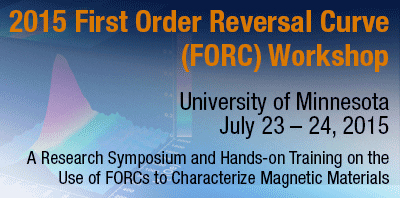 First-order reversal curve (FORC) analysis is valuable for gaining insight into the relative proportions of reversible and irreversible components of various materials. FORCs are an elegant, nondestructive tool for the characterization of magnetic behavior within carefully engineered materials, as well as natural samples.
First-order reversal curve (FORC) analysis is valuable for gaining insight into the relative proportions of reversible and irreversible components of various materials. FORCs are an elegant, nondestructive tool for the characterization of magnetic behavior within carefully engineered materials, as well as natural samples.
If you are a scientist, an engineer, or a grad student, and you are interested in using FORCs in your area of magnetics research, consider attending the 2015 First-Order Reversal Curve (FORC) Workshop at the University of Minnesota. Organized by Josh Feinberg of the University of Minnesota’s Institute for Rock Magnetism and Leonard Spinu of the University of New Orleans’ Advanced Materials Research Institute, this Lake Shore-sponsored workshop will be held July 23 – 24 at the university’s Newton Horace Winchell School of Earth Sciences. The workshop will include a research symposium and training on the use of FORCs to characterize materials. The first day will begin with an introduction to the theory underlying the FORC technique and will lead into a symposium of invited speakers from a range of disciplines, including:
- Alexandru Stancu (Cuza University)
- Richard Harrison (Cambridge University)
- Kai Liu (University of California Davis)
- Leonard Spinu (University of New Orleans)
- Josh Feinberg (Institute of Rock Magnetism, University of Minnesota)
- Gergely Zimanyl (University of California Davis)
- Victorino Franco (University of Seville)
The second day will consist of hands-on demonstrations, during which participants will be trained on the best practices associated with acquiring high quality FORC data and optimizing the processing of the data. To register and learn more about the two-day event, please visit the workshop website. Questions about the workshop activities should be directed to Josh Feinberg or Leonard Spinu.
Registration will be limited to 80 participants on a first-come, first-served basis. Applications must be received by June 1, 2015.
